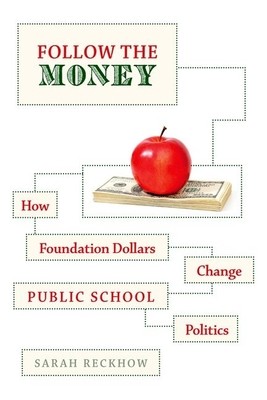
- We will send in 10–14 business days.
- Author: Sarah Reckhow
- Publisher: Oxford University Press, USA
- ISBN-10: 0190227346
- ISBN-13: 9780190227340
- Format: 15.5 x 23.1 x 1.8 cm, softcover
- Language: English
- SAVE -10% with code: EXTRA
Reviews
Description
Some of the nation's wealthiest philanthropic organizations, including the Bill and Melinda Gates Foundation, the Walton Family Foundation, and the Broad Foundation, have invested hundreds of millions of dollars in education reform. With vast wealth and a political agenda, these foundations have helped to reshape the reform landscape in urban education. In Follow the Money, Sarah Reckhow shows where and how foundation investment in education is occurring and provides a penetrating analysis of the effects of these investments in the two largest urban districts in the United States: New York City and Los Angeles.
In New York City, centralized political control and the use of private resources have enabled rapid implementation of reform proposals. Yet this potent combination of top-down authority and outside funding also poses serious questions about transparency, responsiveness, and democratic accountability in New York. Furthermore, the sustainability of reform policies is closely linked to the political fortunes of the current mayor and his chosen school leader. While the media has highlighted the efforts of forceful reformers and dominating leaders such as Joel Klein in New York City and Michelle Rhee in Washington, D.C., a slower, but possibly more transformative, set of reforms have been taking place in Los Angeles. These reforms were also funded and shaped by major foundations, but they work from the bottom up, through charter school operators managing networks of schools. This strategy has built grassroots political momentum and demand for reform in Los Angeles that is unmatched in NewYork City and other districts with mayoral control. Reckhow's study of Los Angeles's education system shows how democratically responsive urban school reform could occur-pairing foundation investment with broad grassroots involvement. Bringing a sharp analytical eye and a wealth of evidence to one of the most politicized issues of our day, Follow the Money will reshape our thinking about educational reform in America.
EXTRA 10 % discount with code: EXTRA
The promotion ends in 16d.12:02:21
The discount code is valid when purchasing from 10 €. Discounts do not stack.
- Author: Sarah Reckhow
- Publisher: Oxford University Press, USA
- ISBN-10: 0190227346
- ISBN-13: 9780190227340
- Format: 15.5 x 23.1 x 1.8 cm, softcover
- Language: English English
Some of the nation's wealthiest philanthropic organizations, including the Bill and Melinda Gates Foundation, the Walton Family Foundation, and the Broad Foundation, have invested hundreds of millions of dollars in education reform. With vast wealth and a political agenda, these foundations have helped to reshape the reform landscape in urban education. In Follow the Money, Sarah Reckhow shows where and how foundation investment in education is occurring and provides a penetrating analysis of the effects of these investments in the two largest urban districts in the United States: New York City and Los Angeles.
In New York City, centralized political control and the use of private resources have enabled rapid implementation of reform proposals. Yet this potent combination of top-down authority and outside funding also poses serious questions about transparency, responsiveness, and democratic accountability in New York. Furthermore, the sustainability of reform policies is closely linked to the political fortunes of the current mayor and his chosen school leader. While the media has highlighted the efforts of forceful reformers and dominating leaders such as Joel Klein in New York City and Michelle Rhee in Washington, D.C., a slower, but possibly more transformative, set of reforms have been taking place in Los Angeles. These reforms were also funded and shaped by major foundations, but they work from the bottom up, through charter school operators managing networks of schools. This strategy has built grassroots political momentum and demand for reform in Los Angeles that is unmatched in NewYork City and other districts with mayoral control. Reckhow's study of Los Angeles's education system shows how democratically responsive urban school reform could occur-pairing foundation investment with broad grassroots involvement. Bringing a sharp analytical eye and a wealth of evidence to one of the most politicized issues of our day, Follow the Money will reshape our thinking about educational reform in America.


Reviews